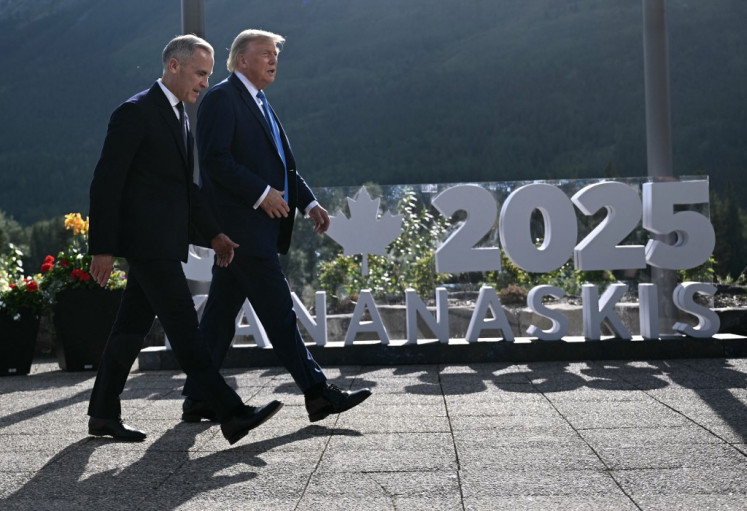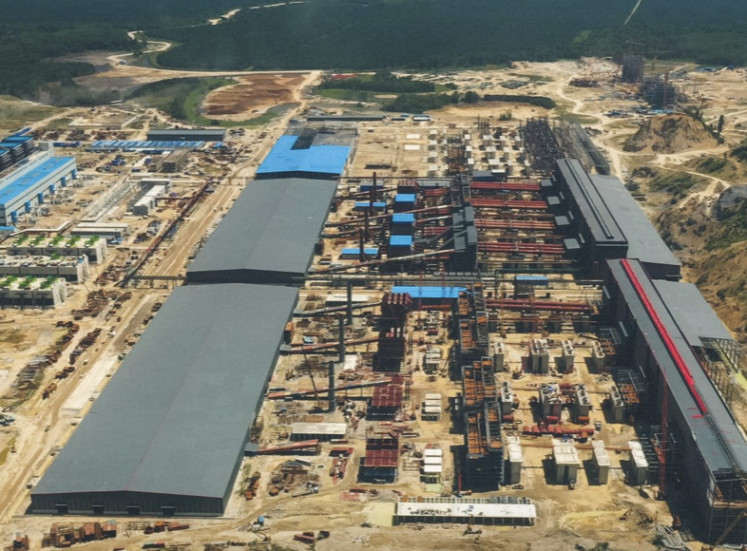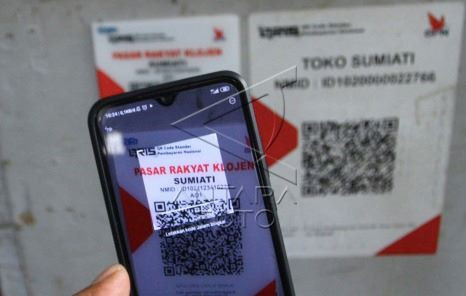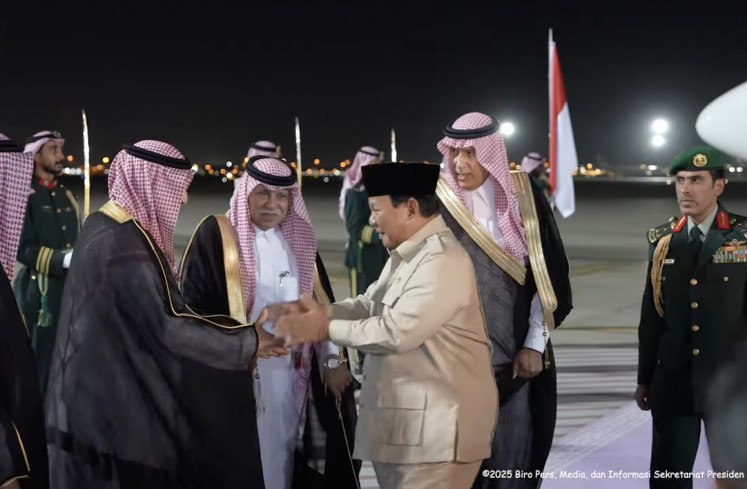Popular Reads
Top Results
Can't find what you're looking for?
View all search resultsPopular Reads
Top Results
Can't find what you're looking for?
View all search resultsHabibie: Icon for Indonesian mothers and children
In the 1980s, even until now, many Indonesian mothers and children would answer “Habibie”, when asked of their role model for their children. Habibie was adored by millions because he was a genius. He was the symbol of Indonesia’s ambition to be equal with industrialized countries in the mastery of advanced technology, including in producing commercial and military aircraft and sophisticated military weapons.
Change text size
Gift Premium Articles
to Anyone
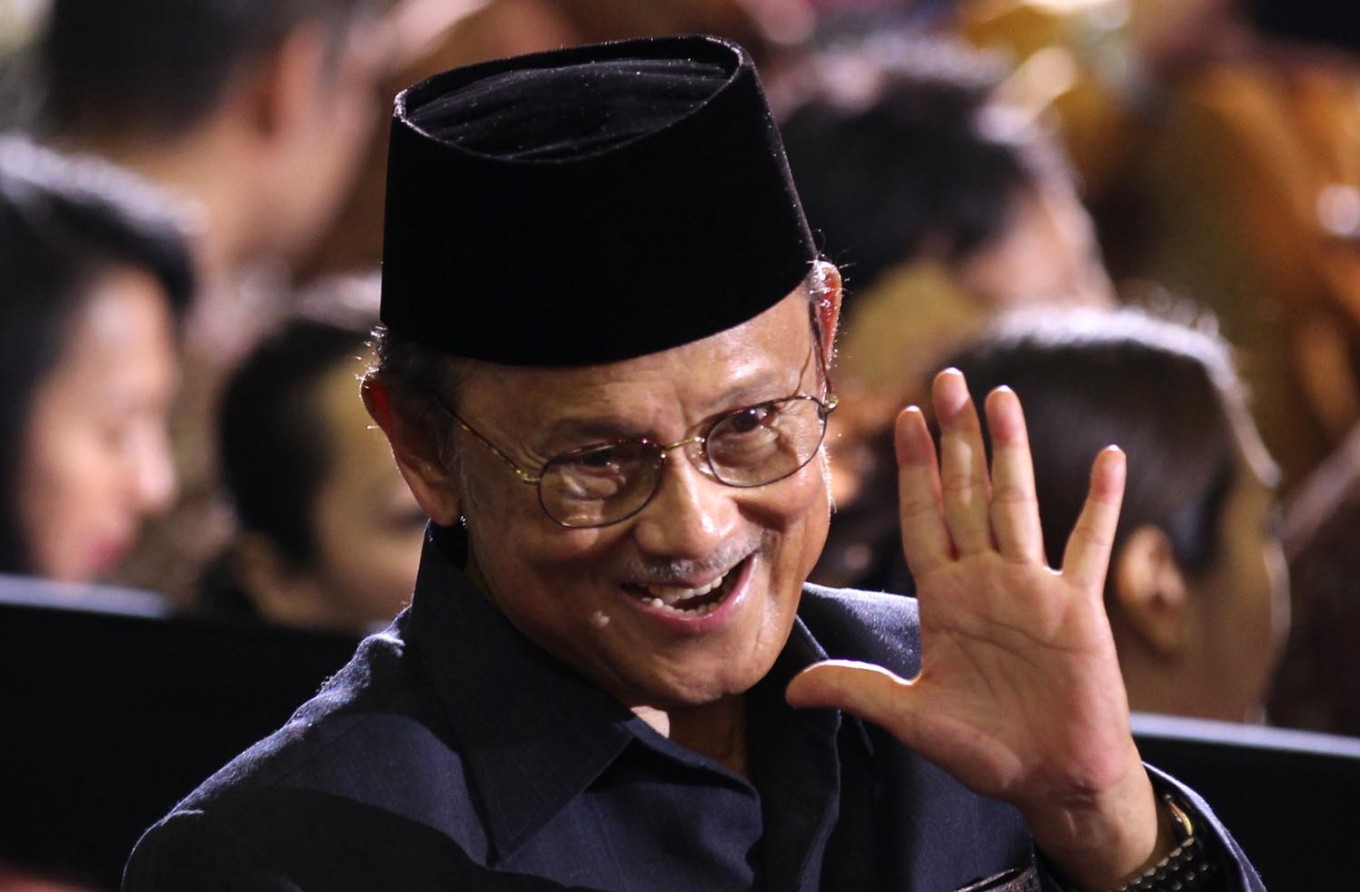 Former Indonesian President Bacharuddin Jusuf Habibie waves to supporters as he sits with the audience to hear US President Barack Obama deliver his keynote speech at the University of Indonesia in Jakarta on November 10, 2010. (AFP /Barbara Walton)
Former Indonesian President Bacharuddin Jusuf Habibie waves to supporters as he sits with the audience to hear US President Barack Obama deliver his keynote speech at the University of Indonesia in Jakarta on November 10, 2010. (AFP /Barbara Walton)
W
hat was Bacharuddin Jusuf Habibie most proud of when he served Indonesia as the country’s research and technology minister, as vice president and then as president? He played crucial and controversial roles for Indonesia. The man who could talk for hours explaining his vision was the country’s only minister who could confidently tell journalists that the president agreed with his proposal even before he met his boss.
As a journalist who covered the Presidential Palace for years, I sensed he seemed most proud not of his achievement as an internationally recognized expert on the aircraft industry, but his romantic relationship with his wife. Habibie loved German food, music and fashion because he spent years in Germany both as a student then as a senior executive at an aerospace company. Basically he was a liberal in politics and his aides would never hesitate to heatedly debate him.
“My wife always treats me like her patient. She is very strict with my diet, especially with my favorite chocolate. But I always find my own way to escape her super tight control,” the third president said when I saw him eating German-made chocolate at the Merdeka Palace in 1999. He offered me some.
According to his adjutant Col. Tubagus Hasanuddin (now a lawmaker), one of his most important duties was to hide Habibie’s favorite cookies and candies from his pediatrician wife, including inside the presidential limousine. “Bapak always feels excited to eat the food while in his car and jokingly praises my ability [to hide it] as an Army officer,” Hasanuddin once said.
His love for his wife was legendary. It is very rare, probably even globally, that a film of a love story between a former president and his wife is so well received by millions of people that the producer decides to make another film about the same person. Habibie & Ainun was a box office hit in 2012, as people thronged to watch the romance of Habibie and his wife.
The film was released two years after the death of Hasri Ainun Habibie. They were married in May 1962, and they had two sons, Ilham Akbar Habibie and Thareq Kemal Habibie. Habibie was so devastated about his wife’s death that he visited her grave almost every day for years.
In the 1980s, even until now, many Indonesian mothers and children would answer “Habibie”, when asked of their role model for their children. Habibie was adored by millions because he was a genius. He was the symbol of Indonesia’s ambition to be equal with industrialized countries in the mastery of advanced technology, including in producing commercial and military aircraft and sophisticated military weapons.
In January 1974, then-president Soeharto, who had known Habibie personally since his childhood, appointed him as his advisor on advanced technology and aeronautics. As written in his official autobiography published in 2006, Decisive Moments, Indonesia’s Long Road to Democracy, Soeharto entrusted Habibie with helping him “lay the foundations for Indonesia in entering a new century” and said that “Dr. BJ Habibie may do whatever is necessary, and God willing, I shall to the best of my abilities always strive to give you my full support.”
Still, according to the book, Soeharto trusted “Habibie’s capacity and capability to build super modern and high technology that is equal with the West” , so he allowed him to control so many strategic industries and allocated nearly unlimited funds for him.
Habibie’s critics said he failed to deliver his promises to his mentor. The International Monetary Fund slashed most of his allocated budget when the economic crisis hit Indonesia in 1997 and 1998. The military resented Habibie because he had the final say on military equipment. Other ministers disliked him because he “spent the money as he wished”.
Soeharto banned the Tempo weekly in 1994 after it reported a controversial purchase of former East Germany’s naval ships. He eyed me angrily when I asked him about the report. “I am not a scalper,” Habibie insisted.
Soeharto brought him to stardom, even appointing him vice president in March 1998. But when protests swept the country, Soeharto was forced to end his 32-year dictatorship on May 21, 1998. According to the Constitution, the vice president automatically becomes president. But Soeharto only agreed to let his “golden boy” become the third president at the very last minute.
Habibie served as president for 512 days, despite being widely viewed merely as “the puppet of Soeharto”. Soeharto never forgave Habibie and reportedly refused to see him until his death in January 2008.
“During my 512 days in power, I was constantly assailed by demonstrations — 3,200 in all […] denouncing BJ Habibie. However, I remained firm in my convictions, even though many experts forecast that I could hang on only for three months,” he wrote.
Habibie immediately released political prisoners and guaranteed press freedom, including the right of Tempo to reappear. He also ensured the provision of everything required to make Indonesia a full democracy, including the abolition of the military’s sociopolitical role.
Indonesia, which many feared was on the brink of Balkanization and economic collapse, held a democratic general election on June 5, 1999. Habibie also let East Timor get rid of Indonesia. Four months later, however, he had to end his term, because the People’s Consultative Assembly rejected his accountability.
Habibie will be remembered with love by future generations. They don’t care whether he was able to realize his vision or not. They find their dream in Habibie.





